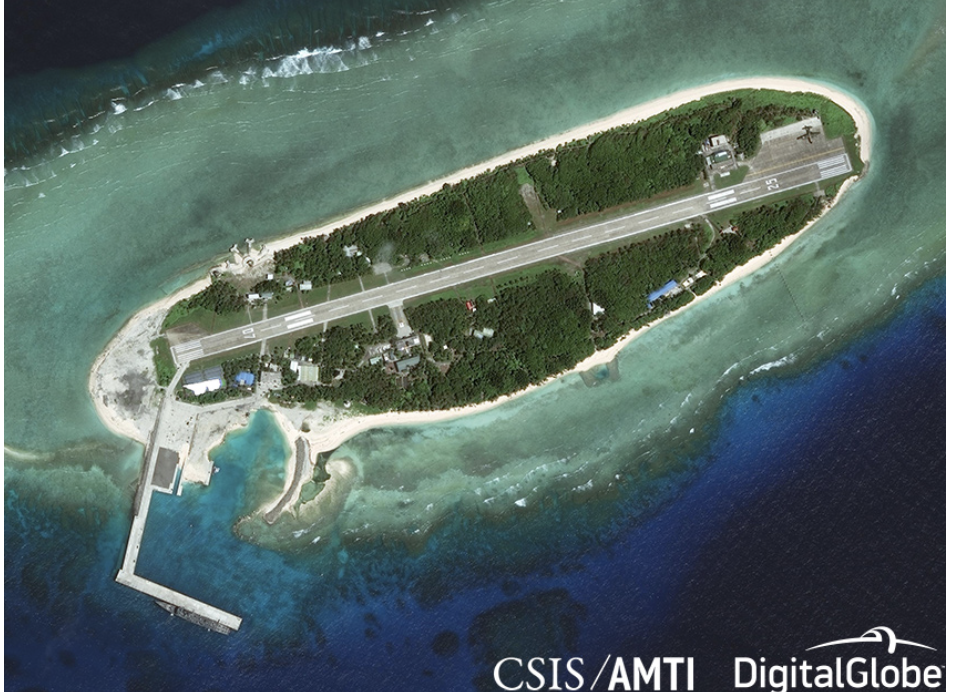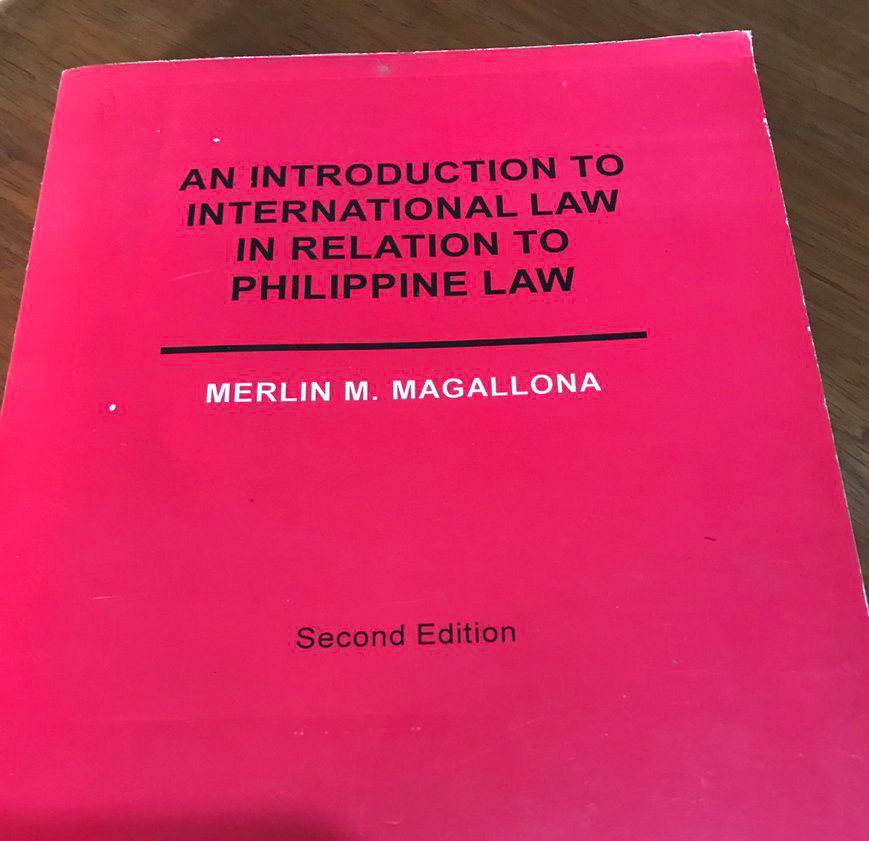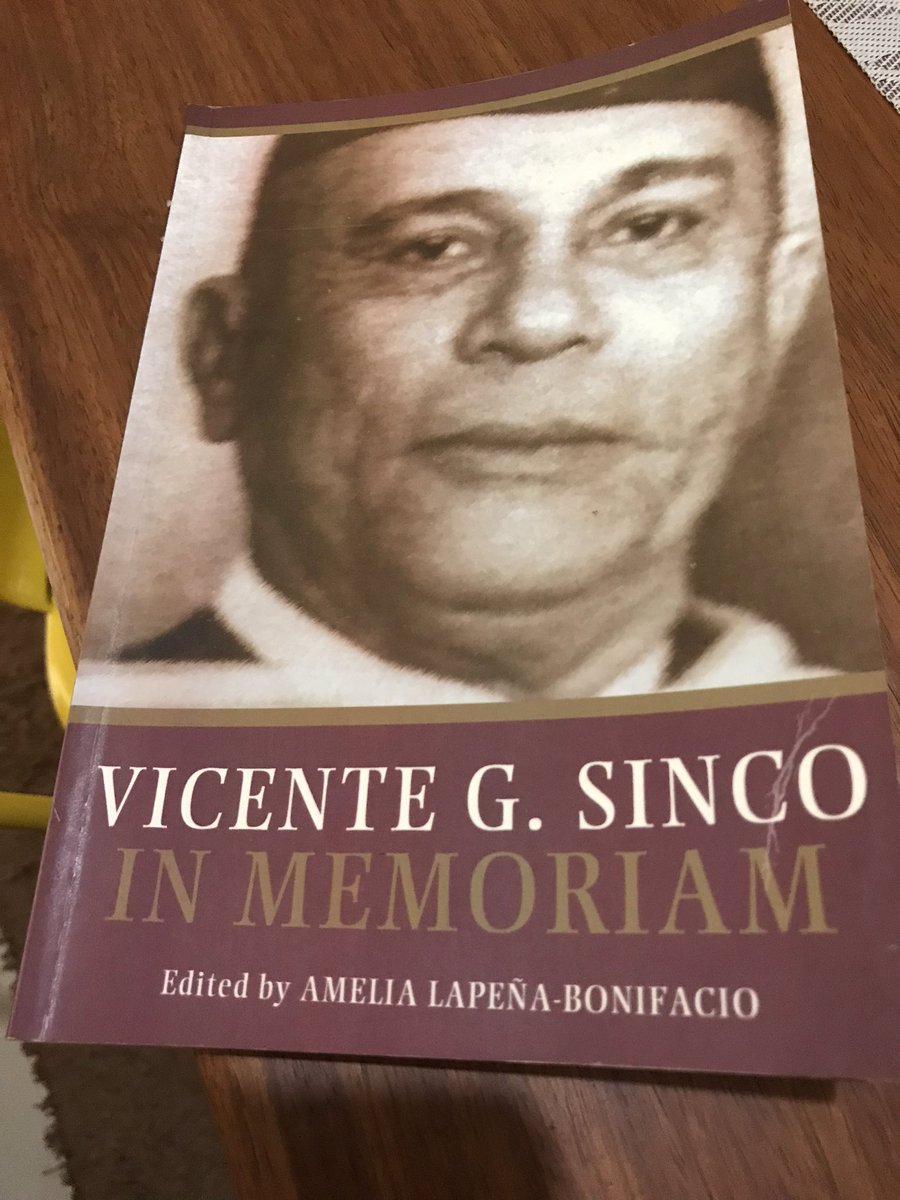Posting here the concluding section of a draft research paper I presented this late January at the ASEAN Law Academy of the National University of Singapore Centre for International Law (please note that given the tentative and unfinished nature of the paper, I am posting this merely for discussion purposes. Nothing in this post may be referenced, cited, or quoted without my permission):
Misunderstood, misinterpreted, misapplied, international law has become a sort of juridical panacea, a universal thesaurus, always at hand for any solution that can be desired in any ticklish litigation. It is even recognized as endowed with aseity.
J. Perfecto, dissenting opinion, Tubb v Reiss
In the 2021 case of Pangilinan v Cayetano, the Philippines Supreme Court expressly recognized for the first time the distinction between objective international law and the Philippine practice of international law and the political function of the Courts when dealing with international legal questions. Pangilinan, a constitutional challenge against President Rodrigo Duterte’s decision to unilaterally rescind Philippine membership in the Rome Statute of the International Criminal Court, affirmed the plenary power of the President to enter into or withdraw from a treaty or international agreement. But in arriving at such a conclusion, it claimed to have done so by employing a view from within Philippine jurisdiction. Questions of consistent application notwithstanding, it so held:
This Court is not an international court. It may only rule on the effect of international law on the domestic sphere. What is within its purview is not the effectivity of laws among states, but the effect of international law on the Constitution and our municipal laws.
Months after these words were written, the Supreme Court handed down a ruling on unprecedented 37 constitutional suits lodged against the new Philippine Anti-Terror Act (ATA) of 2020, Republic Act 11479.
The Philippines’ Kadi Moment?
Relevant to this paper are questions raised by the petitions against the establishment by the law of an Anti-Terrorism Council (ATC). Article 25 of the ATA provided that:
Pursuant to our obligations under United Nations Security Council Resolution (UNSCR) No. 1373, the ATC shall automatically adopt the United Nations Security Council Consolidated List of designated individuals, group of persons, organizations, or associations designated and/or identified as a terrorist, one who finances terrorism, or a terrorist organization or group.
Request for designations by other jurisdictions or supranational jurisdictions may be adopted by the ATC after determination that the proposed designee meets the criteria for designation of UNSCR No. 1373.
The second paragraph of article 25 was but one of only two provisions – of so many put to constitutional challenge by the petitions –in the law that was struck down by the Philippine Supreme Court as unconstitutional, according to media advisory issued by its Public Information Office on December 9 last year.
No further information was released by the Supreme Court on the grounds for the invalidation of the provisions, and the full text of the decision on the consolidated petitions is yet unavailable, until today. Until it is made public, we will not know exactly how the Supreme Court took to heart its own advice in Pangilinan about its role as a domestic court weighing constitutional values against international legal norms.
Elsewhere, the Kadi case has highlighted the tensions that arise between the exercise by the Security Council of its Chapter VII powers and (European) constitutional values, especially in reference to the question of terrorism. Indeed, since the targeted sanctions regime was established by the UN Security Council against terrorism and its supporters and agents, many concerns have been raised about its ‘due process deficiencies.’ And this is despite reforms instituted by the UN in response to the critics, including the establishment of an Office of the Ombudsperson.
Perhaps, the current proceeding against the ATA is not quite the Philippines’ own Kadi moment, as none of the petitions involve alleged actual violations of due process committed pursuant to the implementation of the challenged law.
ASEAN Law’s Rise and Challenge
From the point of view of the Philippine practice of international law, three points may be made on the 11th and 12th modes of direct effect. Firstly, these ASEAN documents exhibiting the 12th mode of direct effect draw their reason for being under earlier ASEAN agreements, either directly drawing from ASEAN treaties or agreements that have undergone the two-step presidential ratification-Senate concurrence procedure, or from documents that came to be by mere presidential ratification and are themselves rooted in other earlier documents.
As in the case of ASEAN documents exhibiting the 11th mode of direct effect, this class of ASEAN agreements are akin to what are considered as executive agreements in Philippine law. Recall that executive agreements in Philippine law have the same binding effect as treaties that require the dualist presidential ratification and senate concurrence have, except that, by virtue of their being drawn from treaties, they no longer require the latter legislative procedure for them to be binding as Philippine law; thus, while they are based on what are essentially dualist devices, they assume quasi-monist tendencies. As such, they could lead to the birth of other quasi-monist agreements that become binding on the Philippines by mere signature of a Philippine representative.
Secondly, in Saguisag v Ochoa, the Philippine Supreme Court, while upholding the status of executive agreements as of the same binding character as treaties, nevertheless held that the former is inferior to the latter.
Executive agreements as such must proceed from an express or implied authorization under the Constitution, statutes, or treaties and do not create new international obligations, otherwise they are considered void from the beginning. Indeed, Saguisag said that treaties are superior to executive agreements: in the case of the former, where legislative imprimatur is required, it is treated on the same status as a statute, so that in case of a conflict, the later law takes precedence over the earlier law, under the principle of lex posterior derogat priori.
However, both treaty and executive agreement ‘are nevertheless subject to the supremacy of the Constitution.’ But more recently in Pangilinan v Cayetano, the Supreme Court reversed the automatic lex posterior rule, holding that statutes, given the process they undergo, are preeminent over international agreements. This stems from a three-part rule the Supreme Court laid down to map out the metes and bounds of the President’s treaty-making powers.
It held thus:
Having passed scrutiny by hundreds of the people’s elected representatives in two separate chambers which are committed-by constitutional dictum-to adopting legislation, statutes enacted by Congress necessarily carry greater democratic weight than an agreement negotiated by a single person. This is true, even if that person is the chief executive who acts with the aid of unelected subalterns, This nuancing between treaties and international agreements, on one hand, and statutes on the other, is an imperative borne by the Philippine’ basic democratic and republican nature that the sovereignty that resides in the people is exercised through elected representatives.
According to Pangilinan, the preeminence of statute over treaty is the basis of the (first) rule that ‘the President enjoys some leeway in withdrawing from agreements which he or she determines to be contrary to the Constitution or statutes.’ Such leeway must be founded on the constitutional doctrine that the Constitution is superior to statutes and international agreements.
Following this, the second rule holds that the President may not unilaterally withdraw from a treaty or international agreement that was entered into pursuant to ‘congressional imprimatur.’ This applies where Congress has expressly authorized the President to enter into a treaty with conditions or limitations as to negotiating prerogatives.’ Thus:
When a treaty was entered into upon Congress’s express will, the president may not unilaterally abrogate that treaty. In such an instance, the president who signed the treaty simply implemented the law enacted by Congress. While the president performed_- his or her function as primary architect of international policy, it was in keeping with a statute. The president had no sole authority, and the treaty negotiations were premised not only upon. his or her own diplomatic powers, but on the specific investiture made by Congress. This means that the president negotiated not entirely out of his or her own volition, but with the express mandate of Congress, and more important, within the parameters that Congress has set.
The third rule provides that ‘the President cannot unilaterally withdraw from international agreements where the Senate concurred and expressly declared that any withdrawal must also be made with its concurrence.’ This happens where the Senate concurred with a treaty or international agreement but expressly indicated ‘a condition that withdrawal from it must likewise be with its concurrence.’ Such condition may be ·embodied in the same resolution in which it expressed its concurrence or in a subsequent resolution.’
So here is the objective international law versus Philippine practice of international law at work: from the point of view of international law, whether the Philippines became a party to an ASEAN document under the Treaty Clause of the 1987 Constitution or via another mode does not matter, for as long as the procedure required by the document itself was followed by the Philippines.
Thus, there is an important distinction that must be made between ASEAN documents that are in the form of treaties and those that are analogous to executive agreements. The former class is superior to the latter, but both do not rise to the same status as the constitution. Thirdly, how do these ASEAN documents exhibiting the 12th mode of direct effect exactly become binding on the Philippines, given that they were signed only by the Philippine Trade and Industry Secretary (at least, in the examples considered)? The answer is the doctrine of political agency, otherwise known as alter ego doctrine in Philippine constitutional law. As explained in the landmark 1939 Philippine case of Villena v Secretary of Interior:
‘[E]ach head of a department is, and must be, the President’s alter ego in the matters of that department where the President is required by law to exercise authority.’ Secretaries of departments, of course, exercise certain powers under the law but the law cannot impair or in any way affect the constitutional power of control and direction of the President. As a matter of executive policy, they may be granted departmental autonomy as to certain matters but this is by mere concession of the executive, in the absence of valid legislation in the particular field. If the President, then, is the authority in the Executive Department, he assumes the corresponding responsibility. The head of a department is a man of his confidence; he controls and directs his acts; he appoints him and can remove him at pleasure; he is the executive, not any of his secretaries. It is therefore logical that he, the President, should be answerable for the acts of administration of the entire Executive Department before his own conscience no less than before that undefined power of public opinion which, in the language of Daniel Webster, is the last repository of popular government. These are the necessary corollaries of the American presidential type of government, and if there is any defect, it is attributable to the system itself. We cannot modify the system unless we modify the Constitution, and we cannot modify the Constitution by any subtle process of judicial interpretation or constitution.
In other words, under this doctrine, the signature of the Philippine representative inscribed in the documents are the President’s, analogous to presidential ratification, unless the President subsequently expressly withdraws the authority given to the former to represent the Philippines in the negotiations and signing of the document in question.
By virtue of the President’s silence over the signature of the Philippine representative, the President is deemed to have ratified it (has the effect of a presidential ratification) under the doctrine of qualified political agency.
The rise of ASEAN law and the Philippines’ commitments to the regional body raises questions of public accountability over how the Executive Department discharges its foreign policy prerogatives. Once again, Pangilinan’s claim presents itself over the propriety of granting direct effect to ASEAN legal instruments by domestic courts.
Wanted: A Postcolonial Constitutional Prudence against ‘Cheap International Law’
J. Perfecto’s dissent quoted in part as the epitaph of this concluding section of the essay provides Philippine academics, lawyers, and judges with much food for thought as regards the role courts must play when faced with an international legal question.
Tubb v Greiss involved two American civilian employees of a US Armed Forces unit based in the Philippines accused of pilfering goods from a US Army depot in the City of Manila. They were arrested by US military personnel and put under general court martial proceedings. They challenged their arrest in a habeas corpus petition, claiming that the US military did not have jurisdiction to try them for violations of the Articles of War, given that they were civilians and not part of the American uniformed services.
Denying the petition, the majority opinion held for the US Army, invoking international law as having provided that ‘a foreign army allowed to march through a friendly country or to be stationed in it, by permission of its government or sovereign, is exempt from the civil and criminal jurisdiction of the place.’
J. Perfecto’s vigorous dissent pointed out that all the international legal authorities cited by the majority opinion are in fact in the two petitioner’s favor, because these authorities were clear that they only applied to soldiers and not to civilians. But more importantly, he argued for a hermeneutic in favor of human rights as recognized in both the Philippine constitution, and even the UN Charter itself.
J. Perfecto said that any erroneous reading of international law justifying the ‘trampling down of the fundamental human rights‘ of petitioners, which ‘are specifically guaranteed in our Constitution and in the constitutions of all democracies and enlightened countries must have been corrected once and for all since June 25, 1945, when the Charter of the United Nations was adopted in San Francisco.’
He noted that the UN Charter itself had pledged, firstly, ‘to reaffirm faith in fundamental human rights, in the dignity and worth of the human person, in the equal rights of men and women and of nations large and small,’ secondly, ‘ to establish conditions under which justice and respect for the obligations arising from treaties and other sources of international law can be maintained,‘ and thirdly, ‘to promote social progress and better standards of life in larger freedom.’ Thus, he wrote:
Anybody will notice that ‘fundamental human rights’ and ‘dignity and worth of the human person’ form part of the supreme concern of the United Nations. Neither the Philippines nor the United States of America can honorably ignore the solemn commitments entered into by them as members of the United Nations. All the agencies of their respective governments, including tribunals and armies, are duty bound to respect, obey, and make effective those commitments.
The preamble of the charter specifically provides, ‘that armed forces shall not be used, save in common interest,’ the latter comprehending the basic purposes of the organization of the United Nations, such as “promoting and encouraging respect for human rights and for fundamental freedoms for all without distinction as to race, sex, language, or religion.’
There is absolutely no reason why we should be afraid, reluctant, or hesitant in performing our duty to grant petitioners the legal relief to their illegal and unconstitutional deprivation of personal liberty, because our action may displease the army or the government of the United States of America, or because the American army stationed in Manila, may disregard our decision.
He also bristled at what he perceived to be a clear attempt by the American brass who appeared at the court hearings for the petition to intimidate the justices of the Supreme Court:
At the hearing of this case, which took place on March 7, 1947, Atty. Justiniano S. Montano appeared and argued for petitioners and Atty. J. A. Wolfson, for respondent. The latter, accompanied by respondent and two-star generals of the United States Army, garbed in their military uniform, made the statement that this case has been communicated to Washington and that the United States Government is interested in its result. The intimidation implied in the statement compelled counsel for petitioners to make an impassioned protest against the uncalled-for statement and one of the Justices made the statement to the effect that this Court shall not allow any outsider to influence it in deciding this case.
J. Perfecto lamented that no mention has at all made in the Supreme Court’s decision of the incident, and this was ‘notwithstanding the fact that it involves a clear attempt to jeopardize the authority and dignity of this Court.’ But the root of the juridical problem presented by the majority opinion in Tubb, according to J. Perfecto, is ‘cheap international law’ – one that ‘has nowadays become a fashion in judicial and legal circles.’ Thus:
Under the spell of international law, the sense of legal values has suffered and is enduring a moral disturbance, blurring judicial vision. Swayed by the transient infatuation of the new legal fad, the majority allow themselves to be blindfolded by the fulgor of the newly found juridical shibboleth to ignore petitioner’s clamors for the vindication of their constitutional rights, as guaranteed by fundamental law, condemning their earnest prayers for relief to the futility of ‘vox clamantis in diserto.’Such is the glamor of the resounding international law that it was able to drown and obliterate completely the humanitarian and lofty tenets stereotyped in the Constitution by the will of the sovereign people.
For him, this cheap international law – this ‘awry judicial attitude’ –to which aseity has been ascribed stems from a misinterpretation of the Incorporation Clause of the constitution. This clause, according to J. Perfecto, has been erroneously understood to mean that international law has been made part of the constitution as ‘superior to the primary principles and fundamental guarantees expressly enunciated therein.’
Thus, to correct this error, he proposed that the Supreme Court recall the following ‘basic ideas’:
- That the declaration that the Philippines ‘adopts the generally accepted principles of international law as part of the law of the Nation’ is an enunciation of a general national policy but never intended to lay down specific principles, provisions, or rules superior or even equal to the specific mandates and guarantees in the fundamental law.
- That ‘the generally accepted principles of international law’ made part of our statute books are not placed in a higher legal hierarchy than any other law that Congress may enact.
- That said ‘generally accepted principles of international law’ are not fixed and unchangeable but, on the contrary, may undergo development and amplification, amendment and repeal, that is, the same biological rules that govern all laws, including the fundamental one.
- That the general statement made by the Constitution implies that the principles of international law which should be considered as part of the law of the nation are subject to determination by the agencies of our government, including courts of justice, and once determined they may be amended, enlarged or repealed, exactly as any act of Congress.
- That those principles are to be gathered from many sources — treaties and conventions, court decisions, laws enacted by legislatures, treatises, magazine articles, historical facts and others — and the majority of them must be sifted from conflicting opinions coming from said sources.
- That the provisions of the Constitution should always be held supreme and must always prevail over any contrary law without exempting principles of international law, no matter how generally or universally they may be accepted.
The limitations of this paper prevent me from making a full examination of these guidelines that J. Perfecto proposed that the Supreme Court observe when dealing with international legal questions.
But in brief, I offer the following concluding remarks: firstly, these basic ideas cohere with domestic courts unafraid to be a sovereign rule-giver rather than just a rule-taker in international law. Secondly, such rule-giving is understood to spring from a careful (and not a mechanical) examination of a wide array of sources and the Philippines’ best constitutional traditions. Finally, such rule-giving does not limit itself to court decisions but comes from a much broader embrace of state practice: by all agencies of government. This therefore requires of agencies of government charged with implementing international commitments to take their task seriously as one of constitutional importance.

 I’m posting here links to a series of articles we have published in the last four months in the opinion pages of the Philippine Daily Inquirer (mostly) in the run up to the 5th anniversary of the 2016 South China Sea Arbitral Award.
I’m posting here links to a series of articles we have published in the last four months in the opinion pages of the Philippine Daily Inquirer (mostly) in the run up to the 5th anniversary of the 2016 South China Sea Arbitral Award. I recently made a backup copy of a recording I made two years ago of a brief conversation with
I recently made a backup copy of a recording I made two years ago of a brief conversation with  One of Dean Sinco’s innovations as UP president was his introduction of the ‘end-to-end approach’, in which students were taught a few subjects at a time, devoting longer periods each day until the whole course was covered and final examinations were given, before another set of subjects were taken. (I encountered a version of this in grad school in Amsterdam in 2006-2007).
One of Dean Sinco’s innovations as UP president was his introduction of the ‘end-to-end approach’, in which students were taught a few subjects at a time, devoting longer periods each day until the whole course was covered and final examinations were given, before another set of subjects were taken. (I encountered a version of this in grad school in Amsterdam in 2006-2007).